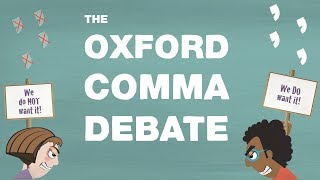(单词翻译:单击)
Say you're helping plan a friend's party, and he sends you a text asking you to "bring Bob, a DJ and a clown."
假设你准备帮你的朋友组织一个聚会,你朋友给你发了一条短信要你记得叫上鲍勃,一个DJ和一个小丑。
You're pretty impressed. You had no idea Bob was so multitalented.
你感到好惊讶。你感叹于鲍勃这个人可以如此多才多艺。
But when the day arrives, it turns out that he's not, and you were supposed to bring three different people.
不过当那天到来时,你发现并不是这样的,你应该叫上三个不同的人。
As you and Bob sit at the silent, clownless party, it occurs to you that the confusion could've been avoided simply by using another comma after DJ.
当你和鲍勃在这个无音乐,无小丑的聚会中尴尬着,你意识到,其实这样的尴尬是本可以避免的,那条短信中只要在DJ后面加上一个逗号,误会就消除了。
This final comma in a list, placed directly before the main conjunction, such as and, or, or nor, is called the serial comma, or Oxford comma.
那个直接放在主要连词,比如and 和 or之前的句子最后一个逗号,我们称之为连续逗号或者是牛津逗号。
And it has long driven grammar nerds crazy because even major language institutions can't agree on whether it should be used.
这个玩意对于语法的痴迷分子的折磨由来已久,因为即使是那些权威的语言机构对于它是否应该正式被使用,也无法给出统一意见。
Ironically, the Oxford comma is more common in the United States, where it's recommended by the MLA,
讽刺的是,牛津逗号反而在美国使用的更加普遍,因为它被一些主流机构推荐,如现代语言协会,
the Chicago Style Manual, and the US Government Printing Office, though not by the AP Style Book.
芝加哥文体手册还有美国政府印刷办公室,但是美国联合印刷手册不在其中。
In the UK and other English-speaking countries, most style guides do not support the comma's use,
在英国以及一些英语国家,很多的文体指南并不是很支持逗号
with the exception of its namesake, the Oxford University Press.
在除了人名的表达之外的地方使用,如牛津大学出版社。
Why not use the serial comma?
为什么不使用连续逗号呢?
One of the main arguments is that the conjunction is usually enough to denote a separate entity.
论据之一就是连词的本身已经可以足够可以分割不同的名词实体了。

And where it's not, like in your ill-fated invite list, changing the order of terms will usually do the job.
其实就拿张倒霉的邀请卡来说,改变几个名词的次序也于事无补。
Journalists also dislike the comma because it takes up precious space and can make text look cluttered.
新闻工作者也不待见逗号,除了占用宝贵的空格空间之外它还会使文章看上去杂乱无章。
Sometimes, it can even create confusion of its own.
有时候,它还会带来理解上的误会。
For example, if your friend had asked for "Bob, a DJ and a puppy," you'd probably figure out that they're three separate beings.
比如,如果你朋友要你叫上鲍勃,一个DJ和一条狗。你可能会认为他们是三个东西。
Puppies are cute, but they don't make great DJs.
狗狗即便可爱,但是它们也不能是DJ。
With the comma, you may think Bob is the DJ, and all you need is him and the puppy.
加了逗号之后你可能会以为鲍勃就是DJ,而你要叫上的是两样事物,DJ鲍勃和狗。
The argument over the Oxford comma has raised such strong passions over the years that a sort of truce has been reached.
关于牛津逗号的争论在很长一段日子里引起过大家热烈关注,直至后来大家达到共识,同意停战。
The common wisdom is that its use is optional, and depends on whether it will help to avoid confusion.
通常的观念是认为如果逗号可以帮你在一句话里避免歧义,你可以自由选择是否用它。
For one thing, you're supposed to keep your use or avoidance of the Oxford comma consistent throughout a whole piece of writing.
你要做到在一篇文章里面,无论你使用或是不使用逗号你都要做到前后一致,要么你就通篇用,要么反之。
So, using it only where necessary is not an option.
所以,能不用还是尽量不用。
And the very idea of a grammatical rule being optional is a bit odd.
而任何关于我们可以选择性的去遵从语法规则这样的论调多少有点奇怪。
Imagine that you hadn't messed up the party planning, and read the next day that "everyone had a great time - ninjas, pirates, vikings, old and young."
想象一下,如果你顺利策划了那个聚会,第二天,你朋友给你发了一条短信,说昨晚个个都开心,忍者啦,海盗啦,维京人啦,老的小的。
If the Oxford comma were standard, you would notice it missing and conclude that old and young must describe the awesome guests already listed.
如果牛津逗号是要规范使用的,你会发现它在这里缺失了,你推断老的和小的指的就是之前提到很酷的忍者什么的。
But as things stand, you will always wonder whether it means that a bunch of regular, boring kids and old people showed up as well.
但是还有一个可能性,你会质疑这老的和小的是不是是指另外一个在聚会上出现过人群,无趣的小孩和老人。
Ultimately, the serial comma may be useful or annoying,
归根结底,连续逗号可以是有用的也可以是烦人的,
but your opinion on it, as for many optional things, probably has something to do with whichever style you were raised on.
就像对待别的可选择的规则一样,要和你打算使用的文体和格式,保持一致。
Your high school teachers favored it? It's likely you're still using it.
你高中老师喜欢它?那么你可能也会一直用它。
Your first editor hated it? You probably do, too.
你第一个编辑上司痛恨它?你可能也一样。
And maybe so much hairsplitting over a tiny squiggle on a page is a bit silly.
在一篇字迹难辨的手稿文章里,那么多的吹毛求疵未必让人觉得大可不必。
After all, there are so many bigger problems to worry about.
毕竟这个世界上充满了更多更大的烦心事。
But sometimes, little things can make a big difference.
但有时候,小小的改变可以造成大不同。


